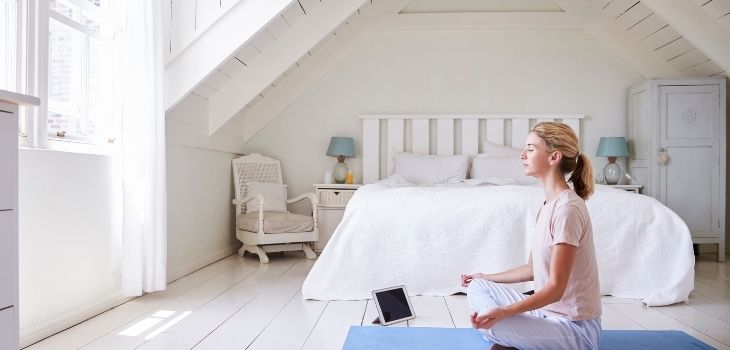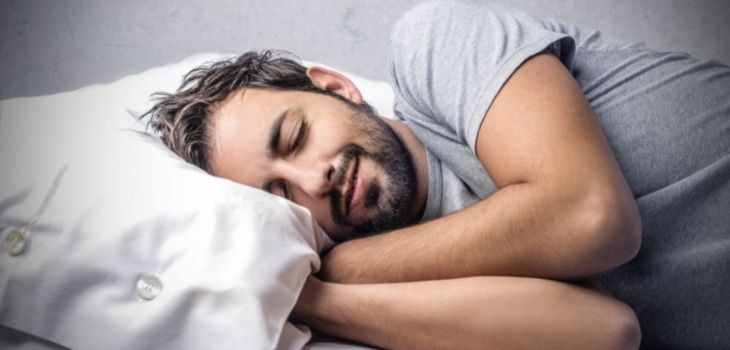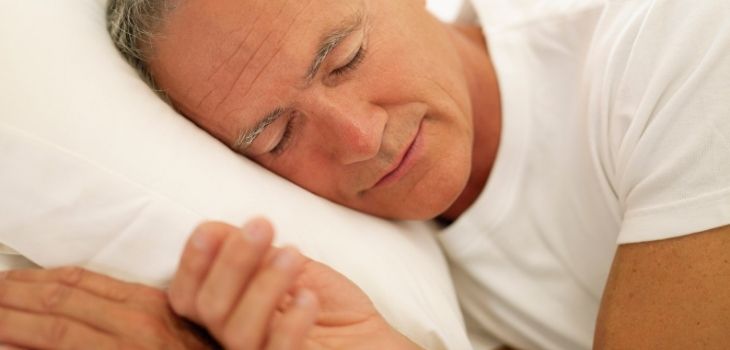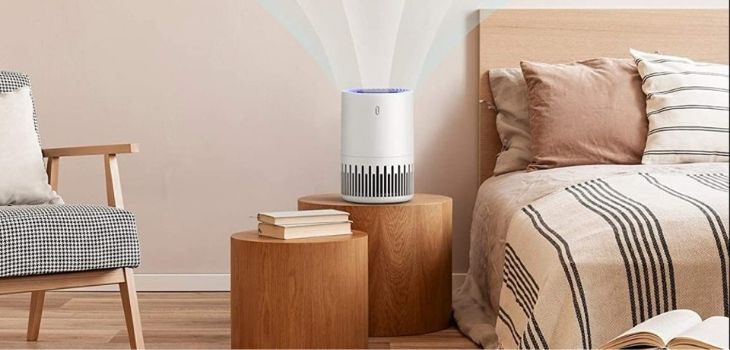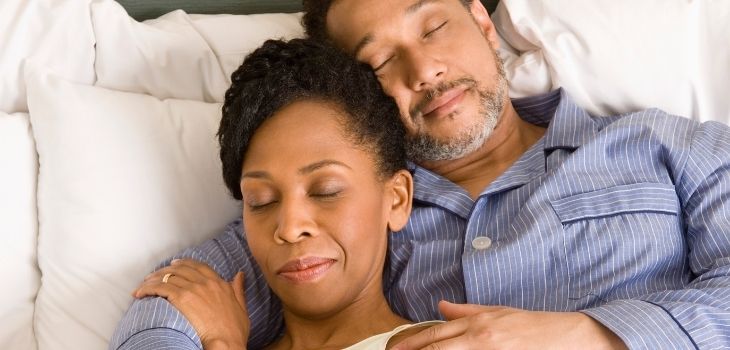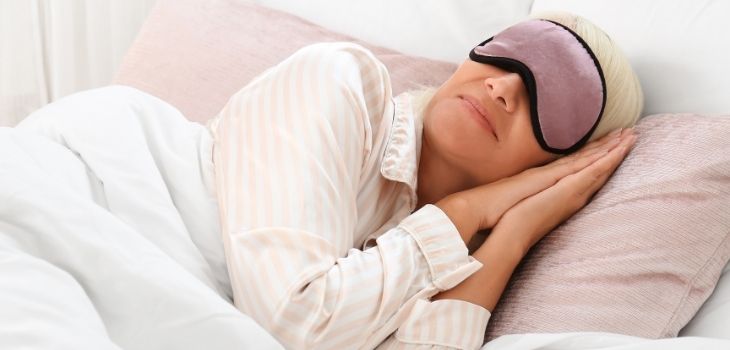
458: Sleep Masterclass Part 2: How Sleep is Affecting Your Weight Loss, Productivity, Performance at Work & Relationships with Ted Ryce
In Part 1, we covered the two processes that drive your sleep, the different stages of sleep, and a bit of basic sleep hygiene. We strongly recommend you give that episode a listen first, so you have the complete context of the foundational principles for this masterclass.
In this second part of our Sleep Masterclass, we will be talking about using your phases of deep and REM sleep for better recovery and productivity.
It focuses on ways to fall asleep faster and stay asleep longer, so you have more opportunities to find quality rest.
For those who wake up frequently at night, we’ll discuss how you can improve ‘sleep efficiency, a measure of how long we stay in bed against how we’re asleep.
We’re also going to cover how to get more restful sleep, with ways to reach deep and REM sleep more consistently.
First things first: sleep loss is a killer.
The best evidence we have suggests that lack of sleep increases your risk for heart disease, cancer, and obesity, among other problems that lead to a shorter life.
It shouldn’t take more than 15 to 20 minutes to fall asleep. This is measured by a term called ‘sleep latency’.
As mentioned in the first part, sometimes our inability to fall asleep comes from too much blue light exposure.
As covered in Part 1, these are the ways you can limit blue-light exposure:
- Install dimmers on light fixtures in your house, so you can avoid
- I also wear blue light-blocking glasses. I recommend Carbon Shades, as they are really effective at blocking harmful light, and they offer the most coverage of the glasses I’ve used.
- Consider using f.lux, a program that adjusts your device screens according to the time of day and mutes any harmful lights.
- Adjust your temperatures so they’re not too hot, but not too cool. In either extreme, the brain will remain alert to protect itself, which prevents sleep.
Your skin monitors environmental temperatures to inform you of external conditions, so you can take measures to protect yourself.
A quick cold shower helps me get ready for rest, but others may require hot showers or baths to reach their comfort zones.
This part requires some experimentation to find the ideal temperature for rest, but your body will let you know which one works by how you feel after.
Of course, you must also consider the comfort of your bedding.
There are memory foam and Tempurpedic mattresses that adjust to your body, cooling pillows, and implements like cooling pads to help you reach that perfect zone of comfort.
As far as the sheets are concerned, I recommend Royal Tradition’s bamboo viscose, and for sleepwear, a brand called Sheex has a selection of comfortable options.
Getting into better shape is another proactive way to increase your comfort levels while you’re laying down to sleep.
Calming a Restless Mind
One of the most troubling obstacles to a good night’s sleep I’ve encountered is racing thoughts. This is when your mind is overactive and prevents you from falling asleep.
The worst part is when you try to force yourself to sleep and it even makes it more difficult to relax.
The cold showers I mentioned earlier can help with this, as lowering the brain’s temperature is a step in the right direction.
In this situation, meditation can also be a lifesaver.
For some, meditation apps like Headspace or Sam Harris’s Waking Up will help you form the proper habits.
However, we shouldn’t ignore the potential benefits of hands-on help from a place that teaches Zen Buddhism or Vipassana meditation.
My personal “go-to” meditation when I’m having trouble sleep is called the 10-points meditation. You can give it a try for free here.
As with finding your comfort zone for sleep, finding an effective means of meditation may require a bit of experimentation before you find the right fit.
Staying Asleep for Longer
Outside a tiny percentage of the population who can function off little sleep, most of us need at least seven to nine hours to function the next day.
Of course, this depends on how much you push your body during the day, either at the job, through workouts, or recreational activities.
The following are ways you can fall asleep faster and stay asleep for longer:
Sleep Secret #1: Reduce Your Caffeine Consumption
Caffeine blocks the interaction of adenosine with its receptors, creating sleep pressure.
When we wake up, our brains begin to produce adenosine as a by-product of our metabolism.
If you recall from Part 1, sleep pressure is our bodies’ natural inclination to sleep which builds as the day progresses.
If we consume caffeine throughout the day, the natural sleep pressure we feel at a decent hour to fall asleep might be absent, so we take longer to fall asleep and have more difficulty reaching REM.
It usually takes around 6 hours for blood-caffeine levels to fall below 50% of their peak values (called ‘half-life).
We must also remember that caffeine is a drug; like all drugs, it is addictive, so the more you consume it, the more you’ll need it.
Sleep Secret #2: Reduce Your Alcohol Consumption
While alcohol often helps people fall asleep, it also disrupts your ability to remain asleep throughout the night.
Alcohol alters your ‘sleep architecture or the stages of sleep that you cycle through in the middle of the night.
We covered the four stages of sleep in Part 1.
Alcohol causes you to spend more time in the third phase, deep sleep, especially early in the night, and less time in rapid eye movement sleep, or REM.
As a muscle relaxer, it also causes more snoring, which increases the likelihood you’ll wake up in the middle of the night.
And since REM sleep is the most useful for bodily recovery, this is problematic.
Sleep Secret #3: Get More Sunlight in the Morning
Getting more light earlier in the day helps to balance your circadian rhythm, our bodies’ internal sleep-wake cycle.
Exposure to artificial lights like fluorescent bulbs at the workplace isn’t the same as natural light.
Sleep Secret #4: Stretching With Deep Breathing
Deep breathing relaxes the muscles, which is useful whether you work out a lot or sit all day since both activity and inactivity can tighten the muscles.
Yoga is equally effective, though you should avoid the more intensive postures since these are for stimulation rather than relaxation.
What is Sleep Efficiency?
Sleep efficiency is the percentage of time you spend lying down that you’re actually sleeping.
Even if you go to bed at a reasonable time, if you’re just laying there for an hour or waking up several times a night, you’re sleeping inefficiently.
Experts estimate that 85% sleep efficiency is ideal.
To measure sleep efficiency, you’ll need something to qualify it.
I recommend the Oura Ring, a device that gives a ton of statistics on the sleep metrics that matter toward efficiency. More than just a sleep metrics tool, the finger band can also track your health during the day, so you have a complete picture of your body at rest versus when you’re active.
If you want to get serious about getting more sleep, about losing weight more effectively, building muscle, or just feeling more rested, I can personally vouch for the effectiveness of the Oura Ring.
The Effects of Air Quality on Sleep
We take a million breaths every month without thinking about air quality and how it affects our bodies and minds.
According to the World Health Organization, 92% of the world’s population is exposed to damaging levels of air pollution.
Indoor air quality can be up to five times more polluted than outdoor air, and it also is responsible for 4 million deaths per year worldwide.
Exposure to household air pollution almost doubles the risk for childhood pneumonia, and it’s responsible for 45% of all pneumonia deaths for children who are less than five years old.
The World Health Organization also says household pollution is also a major risk factor for lower respiratory infections and contributes to 28% of adult deaths to pneumonia.
Not to mention how it affects your quality of sleep.
They gathered we are 60% more likely to have low sleep efficiency when exposed to the highest 25% of air pollution.
You can start by monitoring your air quality so you can take measures to fix it. These measures may include:
- AC filters like Hepa filters
- Air purifiers
- Air-purifying plants. If you can afford the price tag, The National Sleep Foundation recommends the Bedroom Machine by Austin Air.
- Use monitors like AirVisual from IQAir for Android or iPhone. They sell a variety of different hardware monitors to work with the app.
How Do I Get More Restful Sleep?
Restless sleep is when you experience frequent wake-ups
We know this kind of sleep is less restorative than uninterrupted sleep, and it’s one of the biggest causes of excessive daytime sleepiness.
These are the most common causes of restless sleep:
- Stress
- Anxiety
- Sleep apnea
- Noise
- Restless partners
- Frequent urination
We’ll cover ways to deal with stress and anxiety in another series. For now, know that getting more and better quality sleep will help with both.
For sleep apnea, losing weight will reduce the number of incidents that trouble your sleep. Please note that a clinical diagnosis of sleep apnea is a serious condition, and you should rely on medical expertise to help you, not this podcast.
Noise can be handled with a simple pair of soft foam earplugs, and many people use white noise machines or fans to block out jarring sounds.
Those with restless partners may benefit from sharing this series with them since the same methods would apply.
Frequent urination can be caused by a number of complications outside the scope of this series, including prostate issues.
How to Get More REM Sleep
Rapid-eye movement (REM) sleep is when our most vivid dreams occur. During this phase, our eyes move quickly in various directions as our heart beats faster.
Beyond its positive effects on energy and concentration the following day, REM sleep also plays a crucial role in memory, learning, cognitive function, and mood.
Scientists are just starting to understand the consequences of lack of REM sleep, but they know we reach deep sleep and REM sleep less as we get older.
We know now that lack of REM sleep increases the chances of cognitive and memory issues by 9%.
As ‘cognitive and memory’ can apply to all sorts of brain functions, the relatively low percentage increase should still be cause for alarm.
How Much REM Sleep Do We Need
Researchers found that 20% of our sleep needs to be REM to avoid cognitive issues associated with age. Issues arise when this figure drops below 17%.
We are more likely to be woken up from REM sleep than deep sleep.
REM sleep is regulated by your circadian rhythms, which are greatly affected by light exposure.
Again, you must be sure to get enough natural light during the day and avoid overexposure to light at night.
If you don’t get to bed at a decent time, your body won’t have enough time to cycle through its stages of sleep until it reaches REM.
Drugs like caffeine, alcohol and marijuana reduce REM sleep and increase deep sleep.
People who stop consuming marijuana usually dream a lot more, because they are experiencing more REM sleep.
Deep sleep is the most restorative and rejuvenating sleep stage
This is where your body repairs itself from the wear accumulated from daily activities and grows new muscle.
In deep sleep, our blood pressure and heart rates drop, breathing slows, we are more relaxed, and we become difficult to wake up.
We covered the ways you can get more deep sleep in Part 1, so make sure you go back to Part 1 to understand the science of sleep better.
Bottom Line
Sleep plays a key role in your health. If you’re interested in optimal health and well-being, you must make sleep a top priority and incorporate some of the sleep secrets listed in this masterclass.
It’s about time you reclaim your health and take sleep seriously, so you can finally wake up energized every day to live your best life.
Links Mentioned:
- https://www.organifishop.com/collections/organifi-green-juice
- https://wakingup.com/
- https://ouraring.com
- https://justgetflux.com
- https://www.sheex.com
- Royal Tradition’s bamboo viscose
- https://www.headspace.com
- https://wakingup.com
- https://www.dharmaocean.org/foundational-practices
- https://www.who.int/news/item/27-09-2016-who-releases-country-estimates-on-air-pollution-exposure-and-health-impact
- Bedroom Machine by Austin air
- https://www.iqair.com/us
- Carbonshade – Use this code to receive 20% off your first order: TED20
Related Episodes:
- 457: Sleep Master Class Part 1: How Sleep is Affecting Your Weight Loss, Productivity, Performance at Work & Relationships with Ted Ryce
- 441: How Your Body’s Rhythm Could Help You Lose Weight, Sleep Better & Live Longer with Greg Potter
- 430: The Power Of Sleep with Dr. Kirk Parsley
Similar Episodes you may like
About the Show
The Legendary Life is a fun and enlightening look at health fitness, nutrition, biohacking, fat loss, anti-aging, and cutting-edge health advice from celebrity fitness trainer Ted Ryce. Ted’s clientele consists of celebrities, including Richard Branson, Ricky Martin, and Robert Downey Jr., CEOs of multimillion-dollar companies, and other high performers.
He breaks down countless health topics and provides science-backed solutions and the most effective, uncommon strategies to rapidly lose weight, improve your health, and upgrade your physical and mental performance, so you can live the life you deserve.
He breaks it down by providing science-based information so you can clear up the confusion and finally lose weight, fight disease, and live a longer, healthier life.
No guru. No fluff. And no preaching of generic fitness advice here. Along the way, Ted shares his own journey of how he turned great tragedy and loss into success and hope.
Now, his mission is to empower you with the tools and the knowledge you need to live your best life. New episodes every Monday and Friday.


